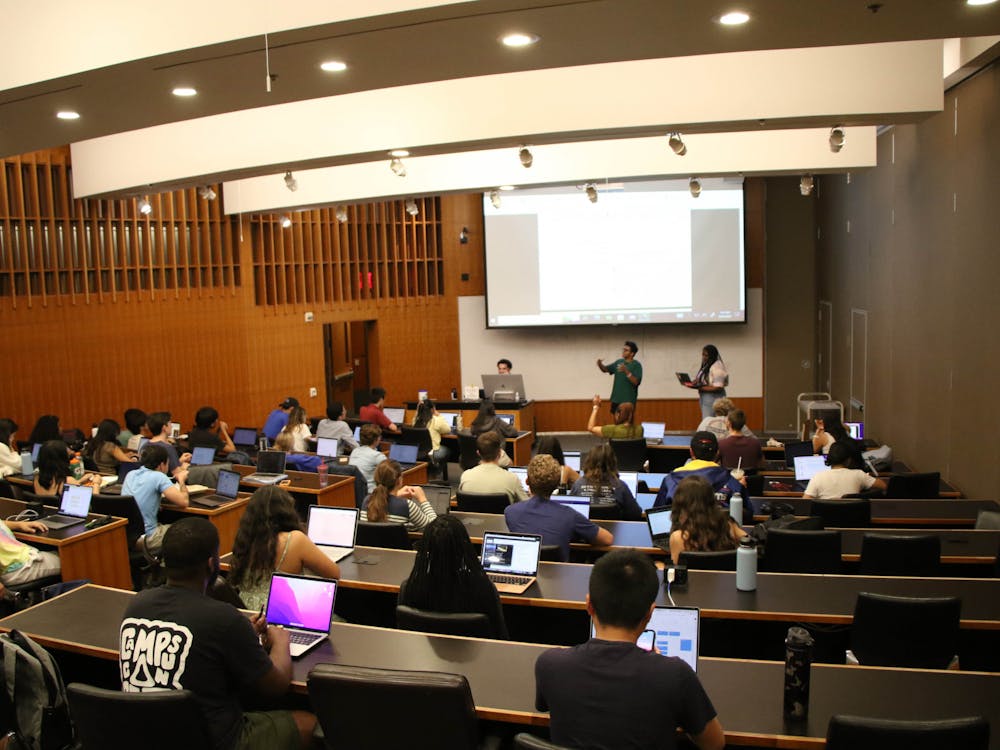Duke Student Government senators heard a presentation on a new initiative in collaboration with the Student Organization Finance Committee and Student Affairs at their Wednesday meeting.
As part of Fun @ Duke, a QuadEx initiative that is aimed at increasing on-campus social gatherings, DSG approved a statute that allows SOFC-approved organizations to allocate up to $7 per undergraduate over 21 years of age for alcohol at an event.
Senior Drew Flanagan, administrative-student liaison and student director of belonging, introduced Fun @ Duke, which seeks to “[create] and [support] a more inclusive, safe, and vibrant campus culture.” Flanagan added that during his DSG presidential campaign the previous year, he found that students longed for a “sense of belonging and connectedness.”
“How do we think about creating a space, creating a culture, where people feel empowered to have events on-campus and do things? I talked with about 60-plus students, whether informally, we met for coffee, and the number one response I got was, ‘Well, I just don't know where to start,’” he said.
The Fun @ Duke initiative is the brainchild of several groups, including SOFC, the Cultural Engagement Fund, Housing and Residence Life and Duke Dining, which set the price cap SOFC-approved organizations can request for alcohol.
DSG President Lana Gesinsky and SOFC chair Hadrian Gonzalez Castellanos, both seniors who created the alcohol funding legislation, presented the statute to senators.
Gesinsky said that the policy isn’t meant to promote that social events require alcohol. Rather, the statute seeks to solve an equity issue.
“A lot of people in college do use alcohol as a way of having some events for 21-plus [students], so we wanted to be able to have that possibility on campus,” Gesinsky said. “It's an equity and accessibility issue, because otherwise, it's just out of pocket and only certain people are able to do that. So this is trying to make alcohol more accessible, but in a safe and controlled environment.”
An October DSG survey asked if students were in support of DSG and administrators creating a policy to allow student groups to pay for alcohol using student organization funds. Gesinsky said DSG received “overwhelming” support from 350 of the 375 students who filled it out.
When a senator asked about how many survey respondents were 21 years old or older, Gesinsky said they did not ask for respondents’ ages.
The DSG alcohol policy statute also pointed to a “working group of students, administrators, and campus leaders” who met during the spring and summer of 2022.
A senator asked how student groups would indicate how many people at events would be able to drink legally. Gonzalez Castellanos pointed to an “honor code,” which SOFC already uses for catering and funding requests.
“We don't really have a way of enforcing [if students] were 21 [years old] or not, but we will trust that they follow the policy as a sort of social host safety rails, let's say, to keep underage people from drinking,” he said.
Events involving alcohol must meet all University guidelines and local and state laws. Payments for alcohol must also abide by SOFC procedures.
Prior to the statute, the only ways students could access alcohol through SOFC funding were through individual reimbursements and internal reimbursement forms between on-campus vendors.
In other business
DSG allocated $2,180 for Black Student Alliance’s Black Caucus, $3,912.90 for Chinese Theater’s The Birth of Actors show, $2,925 for Duke Diya’s Awaaz, $1,817.19 for the Duke Jewish Student Union’s Latkapalooza and $1,638.75 for Duke University Improv’s Little Big show. Senators also allocated $1,000 to the Undergraduate Environmental Union to fund honorariums for speakers for the UEU-sponsored Climate Justice and Global Intersectionality House Course.
Senators heard a presentation from Duke Sexual Harassment and Assault Prevention and Education led by sophomore Kavya Jain and juniors Rhea Tejwani and Ashley Bae. During the presentation, the SHAPE representatives covered their organization’s background and new projects.
Get The Chronicle straight to your inbox
Signup for our weekly newsletter. Cancel at any time.

Audrey Wang is a Trinity senior and data editor of The Chronicle's 120th volume. She was previously editor-in-chief for Volume 119.

